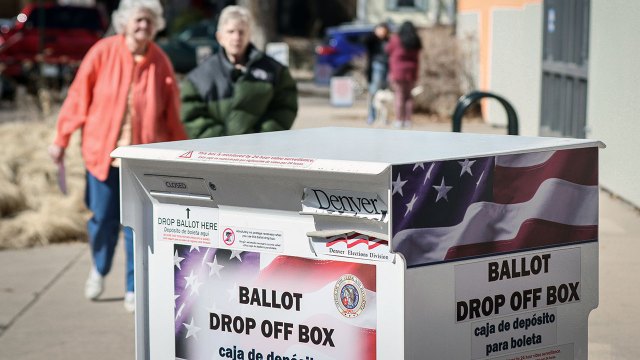
President Donald Trump’s recent pledge to “lead a movement” to end mail-in voting comes as a 58% majority of Americans favor allowing any voter to cast their ballot by mail if they want to.
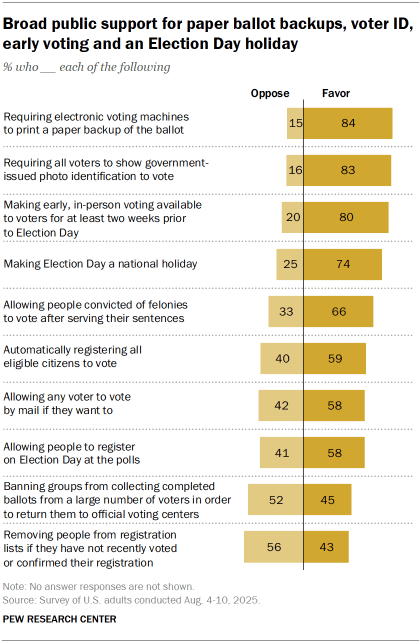
But Democrats and Republicans continue to hold starkly different views: Today, 83% of Democrats and Democratic-leaning independents support no-excuse voting by mail, while 68% of Republicans and Republican leaners oppose it.
Several other proposals related to the U.S. electoral system win widespread support across the political spectrum, according to a new Pew Research Center survey of 3,554 adults conducted Aug. 4-10, prior to Trump’s announcement.
Among the most-supported proposals:
- Requiring electronic voting machines to print a paper backup of a voter’s ballot (84% in favor)
- Requiring all voters to show government-issued photo identification (83%)
- Making early, in-person voting available for at least two weeks prior to the election (80%)
- Making Election Day a federal holiday (74%)
Each of these draws support from majorities in both partisan coalitions.
Of the 10 proposals included in the survey, just two are more opposed by Americans than favored:
- 52% oppose banning groups from collecting completed ballots from a large number of voters to return them to election officials. (This is sometimes called “ballot harvesting” by opponents of the practice and it is currently illegal in about half of states.)
- 56% oppose removing people from registration lists if they haven’t voted recently or responded to efforts to confirm their registration and address.
Automatic voter registration, same-day registration, early voting and voting by mail
In addition to making in-person early voting available for two weeks and mail-in voting available to any registered voter who wants it, about six-in-ten Americans favor automatic voter registration for eligible citizens (59%) and same-day voter registration (58%).
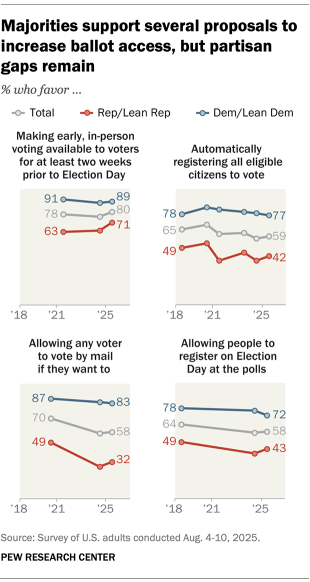
As has long been the case, there is more support for each of these proposals among Democrats than Republicans.
- 77% of Democrats and 42% of Republicans support automatic voter registration.
- Similarly, 72% of Democrats and 43% of Republicans favor allowing registration at the polls on Election Day.
The partisan gap over in-person early voting is narrower, and support has grown among Republicans since last year. Today, majorities in both parties (89% of Democrats, 71% of Republicans) favor at least two weeks of early, in-person voting.
In contrast, there is a wide gap of 51 percentage points in partisans’ support for mail-in voting. And this gap is substantially wider than it was five years ago – the result of a steep drop in support among Republicans.
- In April 2020, during the early months of the COVID-19 pandemic, 70% of Americans favored allowing any voter who wanted to cast a ballot via mail to do so. This included nearly half of Republicans (49%) and nearly nine-in-ten Democrats (87%).
- Now, 58% of Americans support allowing voters to cast ballots by mail, including 32% of Republicans and 83% of Democrats.
Voting by mail is more widespread today than it was before the pandemic, though the share of voters who cast their ballots in person in 2024 was greater than the share who did so in the pandemic election of 2020. According to Pew Research Center’s study of validated voters, voters in the 2024 presidential election were roughly equally likely to have voted in person on Election Day (34%), early in person (32%) or by mail (34%).
Trump voters were more likely to vote in person on Election Day (38% of his voters did so) than voters who supported then-Vice President Kamala Harris (29%).
Voting by mail and state election rules
While support for no-excuse absentee voting is strongly associated with party, both Republicans and Democrats living in states where mail-in voting is more common are more likely to support the practice than those living in states where absentee and mail-in voting is more restricted.
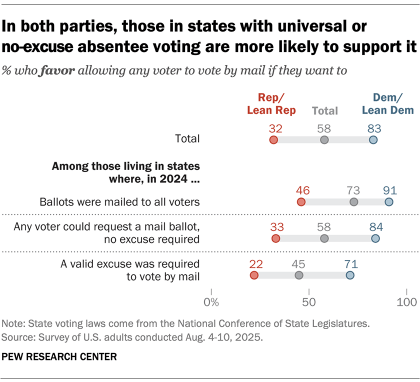
In states with universal mail-in voting – like California, Colorado and Nevada, where ballots are mailed to all voters before the election – 73% favor allowing any voter to vote by mail, including 91% of Democrats and 46% of Republicans.
In states where voters can request an absentee ballot for any reason, but ballots aren’t automatically sent to them – like Florida, New York and Pennsylvania – 58% favor allowing any voter to cast a ballot by mail.
Support for mail-in voting is lowest in states where voters can only cast a mail ballot if they have a valid excuse. (For example, in Texas, excuses include being 65 years of age or older, illness or disability, or a legitimate reason for being out of one’s home county on Election Day.) In these states, 45% favor allowing anyone to vote by mail, including 22% of Republicans and 71% of Democrats.
Other proposals: Voter ID, paper backups, removing inactive voters and ballot collections
Broad bipartisan majorities continue to support requiring electronic voting machines to print a paper backup of the ballot: 84% of all U.S. adults favor this, including 87% of Republicans and 82% of Democrats.
Voter ID

Support for photo ID requirements also remains widespread in both parties. More than nine-in-ten Republicans (95%) and about seven-in-ten Democrats (71%) favor requiring all voters to show government-issued photo identification to vote.
Removing inactive voters, ballot collections
Two other proposals are supported by fewer than half of Americans, both of them winning more support from Republicans than Democrats:
- 45% of Americans – including 55% of Republicans and 37% of Democrats – favor banning mass ballot collections, sometimes called “ballot harvesting.”
- 43% favor purging the voter rolls of those who have not recently voted or confirmed their registration. Some 63% of Republicans and 24% of Democrats support this.
Election Day holiday
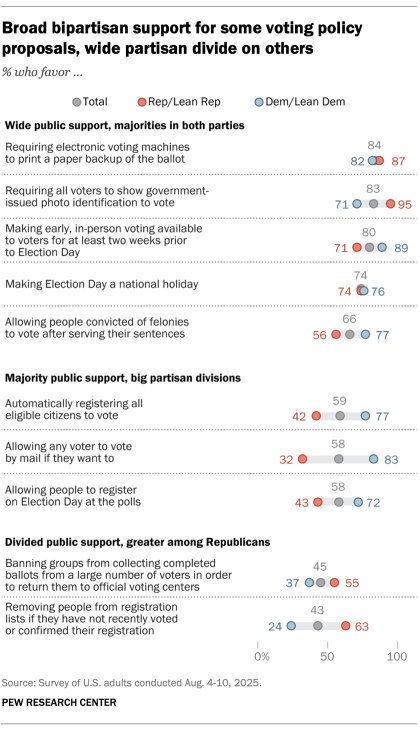
Roughly three-quarters of Americans (74%) – including nearly identical shares of both Republicans (74%) and Democrats (76%) – favor making Election Day a national holiday.
While majorities have favored this proposal for the last several years, support is now 9 points higher than it was in 2018, largely the result of a growing share of Republicans who back an Election Day holiday.
Allowing convicted felons to vote after completing their sentences
Overall, 66% of Americans favor allowing convicted felons to vote after serving their sentences. While majorities in both parties hold this view, support is higher among Democrats (77%) than Republicans (56%).
Views of voting policies among racial and ethnic groups
At least seven-in-ten adults across racial and ethnic groups favor requiring paper ballot backups for electronic voting machines, photo identification requirements and early, in-person voting periods of at least two weeks.
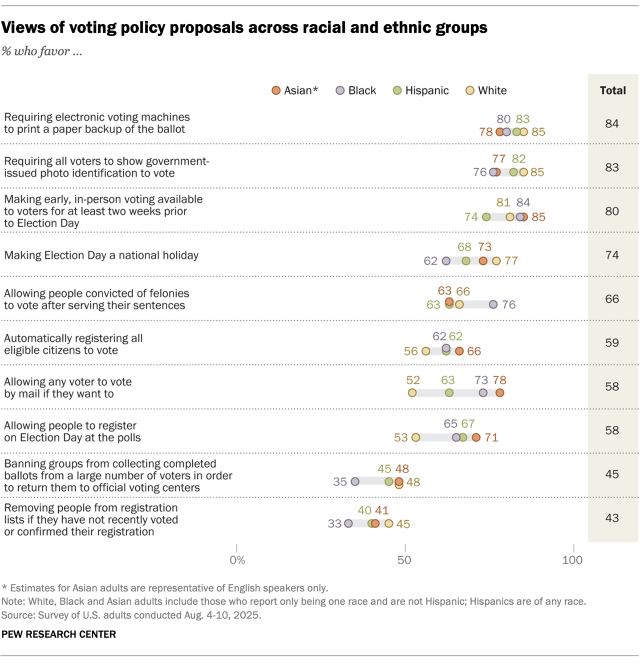
Clear majorities across groups also back making Election Day a national holiday and allowing convicted felons to vote after serving their sentences. Support for allowing people convicted of felonies to vote after serving their sentences is higher among Black adults (76%) compared with other racial and ethnic groups. Still, at least six-in-ten White, Hispanic and Asian Americans also favor this proposal.
At least half of Hispanic, Black, Asian and White adults support automatically registering all citizens to vote, allowing any voter to vote by mail if they want to and allowing people to register to vote on Election Day. But support for same-day registration at the polls and allowing any voter to vote by mail is higher among Hispanic, Black and Asian Americans than among White Americans.




